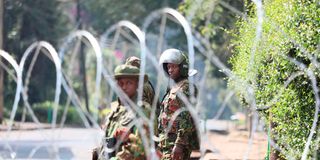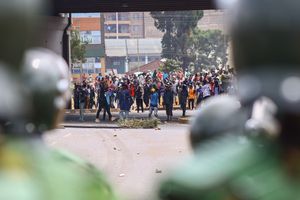
State House Road barricaded with a razor wire. Access is cut off approximately 200 metres from gate D.
The High Court has barred police from barricading roads or blocking access to Nairobi's Central Business District (CBD) during protests.
Justice Lawrence Mugambi issued the temporary order following an application by Katiba Institute, which argued that the police's decision to lock down the capital city using razor-sharp barbed wire and blockades to prevent citizens from accessing the CBD was unlawful and amounted to the suspension of constitutional rights and freedoms.
Katiba argued that the police actions were against the public interest and warned the court that, unless interim orders were granted, unnamed government officials risked turning Kenya from a constitutional democracy into a police state characterized by rampant human rights violations.
"The respondents — the Inspector-General of Police and the Attorney-General — risk rendering the Constitution useless and converting our democracy into an autocracy," Katiba submitted.
Justice Mugambi found the application merited, noting that law enforcement had blocked roads without prior notice to the public. He stated the order aims to prevent undue inconvenience and uphold citizens’ rights.
"Pending the hearing and determination of the petition, a conservatory order is issued restraining the Inspector-General of Police or any officer subordinate to him from mounting barricades, police roadblocks, or blocking entry into the Nairobi CBD and its streets or any roads, without issuing a timely prior advisory or notice to allow citizens to plan their activities accordingly," he ruled.
Neither the Attorney-General nor the Inspector-General responded to the petition or attended the court session. “They were served with the court papers,” the judge noted.
Katiba Institute, through lawyer Malidzo Nyawa told the court that blocking roads without prior notice had inconvenienced the public during planned anti-government protests. He accused the Inspector-General of assuming the power to determine when constitutional rights could be exercised.
Lawyer Nyawa pointed out that the road closures had disrupted access to workplaces, hospitals (including ambulances) and courts where proceedings were adjourned due to the absence of staff and witnesses.
He further noted that the action contradicts a recent High Court ruling which affirmed that the Inspector-General cannot ban protests in the CBD. “Suspension of rights without due process raises serious concerns about the legitimacy and fairness of such administrative actions,” he said.
Lawyer Nyawa also accused the Inspector-General and Attorney-General of using their authority to suppress public dissent both physically and online.
“Their actions amount to attempts to create a militarized society,” he said, “where citizens are unlawfully denied access to public roads and spaces without explanation.”
Katiba CEO Nora Mbagathi, in her affidavit noted that the right to peaceful assembly under Article 37 of the Constitution is a permanent guarantee, yet the State has repeatedly attempted to limit its enjoyment through extra-constitutional measures.
“The Inspector-General has stripped citizens of their rights under Articles 37 and 39. He has assumed for himself the sole privilege of determining how and when Kenyans may exercise their rights,” said Ms Mbagathi.
She stressed that any limitation on rights must follow due process — not surprise street closures. “The public cannot simply wake up to find roads blocked by barbed wire.”
Ms Mbagathi urged the court to urgently prohibit police from arbitrarily blocking roads or banning protests.
“In the absence of an order, the State is likely to continue violating the Constitution and Bill of Rights,” she said.
The petition is pending a full hearing and determination.







